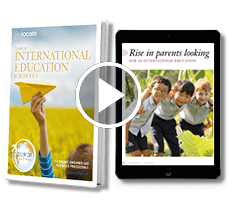An education that’s fit for the future
How then can we ensure today’s education successfully prepares students when the world of tomorrow is so unknown?

Preparing students for further education and employment
Good education providers identify clearly what needs to be learnt, both core knowledge and skills. To do this in a way that is effective in our changing world, they should receive input from a range of stakeholders when developing and revising qualifications.They need to consult regularly with university admissions and faculty staff across the world to ensure qualifications prepare students for undergraduate courses. Students must develop the base knowledge and skills required to make the step up to this next stage of education and thrive at university.Beyond this, as every parent would testify, education must prepare students for employment. That’s why it is also important education providers liaise with employers, ensuring that qualifications develop the relevant skills employers are looking for. For example, Cambridge International recently worked with an international technology company to create and develop our computer science qualification. The company advised on the key skills and knowledge students need to join the IT industry today and helped to ensure technical content was motivating and up to date.How often should qualifications be updated?
There is no right or wrong answer to this question. In fast-moving subjects, such as information technology, content may need to be updated at short notice to keep pace with new developments. We recently updated our IT course to include programming languages for web design because of new software improvements. In other subjects, content may not move on so quickly, but we might need to revisit the balance of skills that are being tested. This could be prompted by feedback from school leaders and subject experts that say they want analytical skills to be tested more rigorously. Our Code of Practice requires us to review our qualifications every six years at a minimum. Each review includes consideration of the knowledge, understanding and skills that students learn as part of their study and that this remains appropriate at the level that is being assessed. Often, we’ll review and update qualifications more frequently, especially where we receive feedback from stakeholders, such as business and university representatives.We assess skills as well as knowledge to ensure that students are developing the habits and techniques that will be used in further study. For example, in our Cambridge International A Level Psychology course, we know that psychology students at university will be required to undertake research and use quantitative skills, so we ensure that these skills are assessed through our question papers and therefore developed in the classroom.
Our Code of Practice requires us to review our qualifications every six years at a minimum. Each review includes consideration of the knowledge, understanding and skills that students learn as part of their study and that this remains appropriate at the level that is being assessed. Often, we’ll review and update qualifications more frequently, especially where we receive feedback from stakeholders, such as business and university representatives.We assess skills as well as knowledge to ensure that students are developing the habits and techniques that will be used in further study. For example, in our Cambridge International A Level Psychology course, we know that psychology students at university will be required to undertake research and use quantitative skills, so we ensure that these skills are assessed through our question papers and therefore developed in the classroom.Developing new qualifications
Of course, sometimes it isn’t enough to update an existing qualification – there are instances where brand new qualifications are required. Education providers again work closely with colleagues within higher education to identify what new qualifications might be needed. They may also receive feedback from schools who request the development of new courses to meet students’ changing needs.Sometimes an education provider identifies gaps in education delivery and seeks to fill them. For example, having seen the range of technologies that students are using as part of Cambridge International A Level Art & Design, we decided to develop a new course in Digital Media & Design. As part of their studies, students are required to respond to a design brief, as if they are working in a design agency, providing them with an avenue of study that prepares them for employment in a digital age.Developing global outlook
Education needs to prepare students to succeed in a globalised economy as, like the readers of Relocate, they could end up working anywhere in the world. Cambridge International qualifications are taken by students in 160 countries around the world, which presents a range of challenges to curriculum developers and question setters.We need to make sure that our programmes are consistent and accessible, even when used in schools with different curricula and cultural contexts, and where English might be the second or third language. The content itself must not be aligned to one specific culture, to ensure it is meaningful and relevant to students all over the world. One example of this is our English Literature course in which the reading list consists of authors from around the world – not just British writers. This consistency of education provides reassurance for parents when moving their children between countries.Change is essential
The world is changing and education must be continuously revised and adapted to ensure learners can meet the needs of whatever the Fourth Industrial Revolution holds in store. Studying the same content their parents learned will not prepare students for the world of tomorrow, but by actively evolving qualifications, we can help students become university ready, work ready and ready for the world.Andrew Coombe, Director, International Network at Cambridge Assessment International EducationThis article is from Relocate Global's Guide to International Education & Schools 2019/20 which is packed with expert tips and information for those relocating and the professionals supporting them. For volume options, co-branded editions, digital or online licence agreements and advertising opportunities, contact Fiona Murchie at +44 (0)1892 891334 or email fiona@relocatemagazine.comNow available as an ebook on Amazon! Simply download from Amazon onto your Kindle, mobile phone or tablet to read wherever you are!
Subscribe to Relocate Extra, our monthly newsletter, to get all the latest international assignments and global mobility news.Relocate’s new Global Mobility Toolkit provides free information, practical advice and support for HR, global mobility managers and global teams operating overseas.
 Access hundreds of global services and suppliers in our Online Directory
Access hundreds of global services and suppliers in our Online Directory For more education and school-related news, visit our Education and Schools pages.© 2019. This article first appeared in the 2019/20 edition of the Guide to International Education & Schools published by Relocate Global, Spray Hill, Hastings Road, Lamberhurst, Kent TN3 8JB. All rights reserved. This publication (or any part thereof) may not be reproduced in any form without the prior written permission of Relocate Global. Relocate Global accepts no liability for the accuracy of the contents or any opinions expressed herein.
For more education and school-related news, visit our Education and Schools pages.© 2019. This article first appeared in the 2019/20 edition of the Guide to International Education & Schools published by Relocate Global, Spray Hill, Hastings Road, Lamberhurst, Kent TN3 8JB. All rights reserved. This publication (or any part thereof) may not be reproduced in any form without the prior written permission of Relocate Global. Relocate Global accepts no liability for the accuracy of the contents or any opinions expressed herein.©2025 Re:locate magazine, published by Profile Locations, Spray Hill, Hastings Road, Lamberhurst, Kent TN3 8JB. All rights reserved. This publication (or any part thereof) may not be reproduced in any form without the prior written permission of Profile Locations. Profile Locations accepts no liability for the accuracy of the contents or any opinions expressed herein.









































